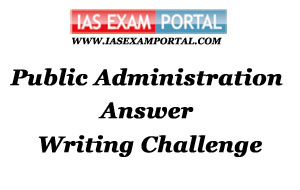Weekly Mains Exam 2016 Answer Writing Challenge - Public Administration "MODULE- 53"

Weekly Mains Exam 2016 Answer Writing Challenge- Public Administration
The main idea behind Weekly Answer Writing Challenges is to make your exam preparation more result oriented. For this exam (UPSC Civil Services), just ‘reading’ is not enough. The most advantageous part of this writing exercise is to make your answer visible to everyone, someone may correct you if they find a mistake in your answer plus it must be also supported by our experts , you may see others answers also. It is free and definitely will improve your writing ability and marks in your final examination. Here all topics from syllabus will be covered.
Public Administration- Paper I "Syllabus Topic – Organisations: Headquarters and Field relationships"
-
Q1. Discuss the problems in securing a sound relationship between Head Quarters and Field Organisations. Illustrate your answer by drawing upon Secretariat- Directorates relationship in India.
Indian Administration- Paper II "Syllabus Topic – Plans and Priorities: Process of plan formulation at Union and State levels"
- Q2. Discuss the problems in the planning process at the state and sub-state levels.
Model Answer:
The Planning Process is India, having being highly centralized in the past as highlighted by Ashok Chanda and K. Santhanam. The ARC envisioned a decentralized process and hence recommended establishment of District Planning Boards with the District being the sub-state unit where data collection takes place and has administrative institutions to facilitate such a planning process. The decentralized planning machinery was given its Constitutional status under the 74th CAA, 1992 as Article 243 of the Constitution.
However, despite the efforts in this direction the devolution has not taken place in its true spirit.
Some of the evident challenges have been :
-
Access to data at a State and sub-state level is with National level institutions and even if access is made available, the State/District planning committees lack the expertise to analyze this data to develop spatial and resource integrated plans
-
Mostly these plans are not aligned to national objectives and hence are not able to get adequate sanctions of funds
-
These bodies are unable to network and integrate resources from different institutions (Central Government, local bodies, credit institutions and voluntary agencies). Also scientific tools such as manpower planning are not used to design employment programmes
-
Current evaluation of programmes has been more input/money spent based rather than outcome based, therefore they lack the knowledge on the impact of development programmes.
-
Even the Bureaucracy and politicians have focused more on the implementation than the planning leaving poor capacity for such a function as district and state levels
-
PRI’s and ULB’s were envisioned as republics of local self government. However, in reality they become receivers of centrally sponsored schemes and are often lured due to the subsidies that come along. Also, the political establishment in these institutions is mostly dominated by the community elite who wish to exercise their discretionary powers instead of curbing such powers through a participatory planning process
-
Also, there is an inherent bias towards a central planning process thereby limiting a transition to a decentralized planning process
Therefore, despite the constitutional provision to devolve powers and create a decentralized planning machinery, there is still much work to be done for to get participation and its due recognition in the national plans.
